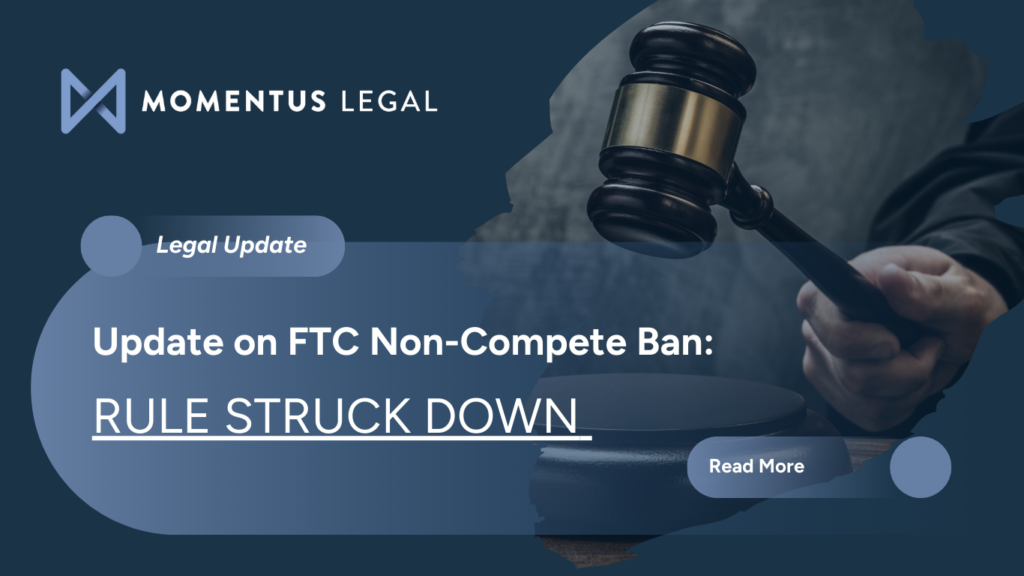At Momentus Legal, we’ve been keeping a close watch on the developments surrounding the Federal Trade Commission’s (FTC) proposed rule that aimed to ban nearly all non-compete agreements. Originally, this rule was set to take effect on September 4, 2024, but recent legal challenges have led to a nationwide injunction, preventing the rule from going into effect as planned.
Background: The FTC’s Non-Compete Rule and Initial Court Rulings
The FTC’s proposed rule was designed to prohibit nearly all non-compete agreements, which have long been used by employers across various industries to protect trade secrets, maintain competitive advantages, and safeguard proprietary information. The rule, as initially outlined, would have had significant implications for businesses, employees, and the broader economy.
On July 3, 2024, the U.S. District Court for the Eastern District of Texas issued a preliminary injunction in the case of Ryan, LLC v. FTC. This injunction set aside the rule’s effectiveness, but only for the plaintiffs involved in that specific case, leaving the rest of the country uncertain about the rule’s future.
Following this decision, the Eastern District of Texas considered motions and cross-motions for summary judgment that would determine whether the rule should be stricken on a nationwide basis and impact employers and employees across the United States.
The August 20, 2024 Decision: A Nationwide Impact
On August 20, 2024, the court issued a significant ruling that has now set aside the FTC’s non-compete rule on a nationwide basis. The court found the FTC’s rule to be impermissible for two primary reasons:
- Exceeding Constitutional Authority: The court ruled that the FTC exceeded its constitutional authority in issuing the non-compete rule. Specifically, the court emphasized that the FTC’s role as an administrative agency is to carry out the directives of Congress rather than to create substantive rules based on its own judgments. The ruling stated, “The FTC lacks substantive rulemaking authority with respect to unfair methods of competition,” and thus, the agency “exceeded its statutory authority in promulgating the Non-Compete Rule.”
- Arbitrary and Capricious Nature of the Rule: The court also found that the rule itself was “arbitrary and capricious.” It criticized the rule for being overly broad without providing a reasonable explanation and for imposing a “one-size-fits-all approach with no end date.” The court noted that the FTC’s justification for the rule was based on a limited number of studies examining the economic effects of state policies on non-competes, none of which had enacted a ban as broad as the FTC’s proposed rule. The court further found that the rule failed to account for the potential positives of non-compete agreements and did not adequately consider less-restrictive alternatives that could have achieved similar objectives.
The ruling suggested that the FTC relied on inconsistent and flawed empirical evidence and disregarded the substantial body of evidence that supports the use of non-compete agreements in protecting business interests. Furthermore, the court pointed out that the FTC did not sufficiently address potential alternatives to the rule that could have resulted in a more balanced approach rather than an outright ban.
The Broader Implications for Employers and the Future of Non-Compete Agreements
The August 20, 2024 decision has far-reaching implications for employers nationwide. With the FTC’s rule now set aside, businesses are no longer required to comply with the proposed ban on non-compete agreements. This ruling provides relief to employers who rely on these agreements to protect their business interests, maintain competitive advantages, and prevent the loss of key personnel to competitors.
However, the legal landscape surrounding non-compete agreements remains complex and subject to change. The FTC could appeal the Ryan decision, but such appeal would go before the 5th Circuit Court of Appeals and would likely have a small chance of success given that court’s history on these types of matters. As such, businesses should continue to monitor their practices on non-compete matters under the laws of the individual states in which they operate.
In addition to its importance in setting aside the FTC’s rule, the August 20, 2024 Ryan decision is also the first example of how courts will play a more distinctive and impactful role in determining the appropriate scope of an agency’s power in a post-Chevron world. We discussed how courts would play a more central role in dealing with these types of issues after the United States Supreme Court overruled the Chevron case in our prior post here, and now we have a real-life example of that playing out. This will also be something to keep track of moving forward.
What Should Employers Do Next?
Businesses should review their current non-compete agreements and ensure they are in compliance with applicable state laws, as state courts will continue to enforce non-compete agreements according to their respective legal frameworks.
It is also advisable for employers to stay updated on any further legal developments related to this case, particularly if the FTC decides to pursue an appeal. Given the dynamic nature of this area of law, businesses may also want to consult with legal counsel to assess the potential risks and benefits of their current non-compete practices and to explore alternative strategies for protecting their proprietary information and competitive position.
At Momentus Legal, we will continue to monitor this situation closely and provide updates as they become available. Our team is here to assist you in navigating the complexities of non-compete agreements and ensuring that your business remains compliant with the latest legal developments. If you have any questions or concerns about how this ruling may impact your business, please do not hesitate to contact us.
Contact Roddy Stieger:
Email: Roddy.Stieger@momentuslegal.com
Phone : 303.990.2826
LinkedIn: @RoddyStieger





